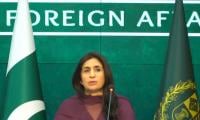ISLAMABAD: The first monthly Covid-19 response monitoring report, released by the Trust for Democratic Education and Accountability-Free and Fair Election Network (TDEA-FAFEN), has suggested that second wave of coronavirus needs prudent handling by stakeholders.
The report stated that with the emergence of the second wave of novel coronavirus, the country may face serious health-governance challenges at both policy and implementation levels that, if not addressed, might jeopardise and reverse the gains made in the first phase of the fight against the pandemic.
According to the report, while the usual challenge of limited resources remained relevant, efforts to control the second wave of Covid-19 infections have to contend with increased politicisation and lack of adherence to the SOPs among the general public as major policy challenges -- factors that were not as significant during the first wave of the pandemic.
The TDEA-FAFEN report observed that the political war between the government and opposition may have a negative impact on Pakistan’s war against Covid-19 in the coming days.
The report observed that the government was able to contain the spread of first wave of the pandemic with complete support of all the opposition parties, however, as the pandemic has become politicised now, this may mean lack of trust in the government and its policies to flatten the curve.
The report observed an increase in the number of new confirmed cases from 313,431 to 333,970 and 324 deaths (rising from 6,499 to 6,823 dead) during October, 2020. This report is based on the data collected through stakeholders’ surveys and direct observation of enumerators deployed in 20 project districts.
The sense of urgency for a more serious and focused response by the government is not only dictated by the rampant increase in infections but also by the state of critical factors such as limited infrastructural capacity at the district level, need for capacity-building of first-line responders, as well as stakeholders like members of the civil society organisations (CSOs) and journalists.
The key findings of report stated coordination mechanisms established to manage response during the outbreak of the pandemic earlier this year, largely remained intact in 14 of the 16 observed districts with key stakeholders, including healthcare staff, elected leaders and CSOs, represented on coordination platforms. The research respondents’ opinion about the effectiveness of coordination mechanisms in 16 districts reflected a variance, with majority (78pc) rating it between average to highly effective.
The inclusive approach is another area where most of the districts claim to have developed and implement safety Standard Operating Procedures (SOPs) in consultation with key stakeholders, including schools, business and traders’ associations. However, as per the opinions of key stakeholders and observation of TDEA-FAFEN’s enumerators, implementation and enforcement of SOPs remained an area of serious concern.
Whereas the government officials in all 16 districts claimed sufficient stock of Personal Protective Equipment (PPEs) – most representatives of doctors’ and paramedics’ associations only partially endorsed the statement. Health facilities in the districts overall remained a significant concern as the testing, quarantine/isolation capacity, and other provisions such as ventilators are feared to fall short if the rate of infections is not slowed down/checked. The capacity in terms of the numbers and skillset of healthcare providers is yet another area of concern; with the doctors in the majority of districts (11 of 16) and paramedic representatives in a third of districts (5 of 14 districts) agreeing that their colleagues were not adequately trained/skilled to deal with Covid-19.
While the challenge of capacity and coordination cannot be overlooked, political and policy dynamics of the Covid-19 response are becoming increasingly critical. During October, legislative oversight remained marginal, while the politicisation of Covid-19 response gathered momentum in the wake of opposition’s ongoing agitation against the government.
According to the TDEA-FAFEN report, in the section of politics and politicisation of Covid-19 response, with rising cases of Covid-19, the nation also witnessed a rise in political temperatures in the country and with the launching of the anti-government campaign by the 11 opposition parties from the platform of the Pakistan Democratic Movement (PDM). A number of political leaders, mostly belonging to the ruling party, in their statements assailed the opposition parties for continuing to hold their rallies despite the rising number of Covid-19 cases in the country. Besides, the government ministers and other ruling party members also praised the prime minister and his team, for what they called effectively controlling the spread of the disease and assisting those affected by it by adopting the policy of smart lockdown. The opposition leaders on the other hand ignored the warnings and requests by the ministers to postpone their agitation plan, alleging that the government intended to impose a ban on their public meetings on the pretext of Covid-19.
President called the Senate meeting under Article 54 of the Constitution
Crowd’s long wait due to persistent rain backed by heavy showers came to an end just for two deliveries with New...
Chief Justice Justice Faez Isa said amendments to the High Court Rules were necessary before appointment of judges
A division bench of the PHC comprising Justice SM Attique Shah and Justice Syed Arshad Ali heard the petition in which...
According to the Senate Secretariat, Gilani emphasized better coordination between the two Houses







